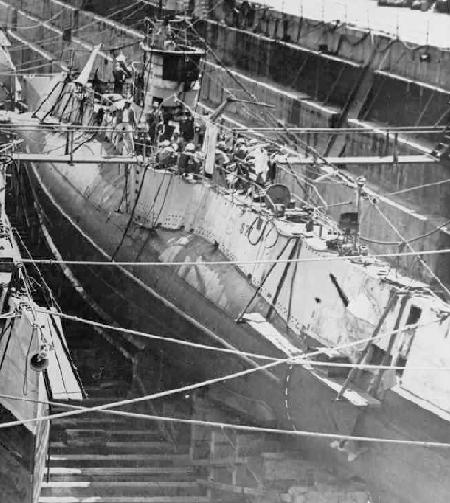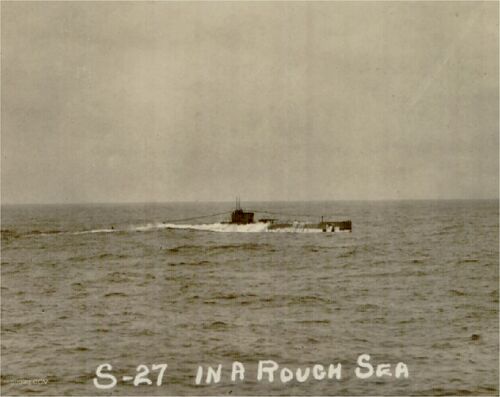S-27: Difference between revisions
Pbcjohnston (talk | contribs) mNo edit summary |
Pbcjohnston (talk | contribs) Finished update for first S-27 photo |
||
| Line 2: | Line 2: | ||
[[File:S-27 at Lahaina TH.jpg|left|500px]] | [[File:S-27 at Lahaina TH.jpg|left|500px]] | ||
<div style="text-align: justify;"><span style="color:#00008B">S-27 and one sister boat underway near Lahaina, Maui in the spring of 1925. The Navy maintained a substantial fleet anchorage right off Lahaina, in the sheltered waters of the Auau Channel. Fleet units would frequently anchor here while taking a break from exercises. This saved time | <div style="text-align: justify;"><span style="color:#00008B">S-27 and one sister boat underway near Lahaina, Maui in the spring of 1925. The Navy maintained a substantial fleet anchorage right off Lahaina, in the sheltered waters of the Auau Channel. Fleet units would frequently anchor here while taking a break from exercises. This saved time by not requiring the transit up the channel into Pearl Harbor on Oahu. | ||
This photo shows S-27 in her as-built configuration. She would be modified in the late 1920's in the wake of the [[Notable Submarine Accidents| | This photo shows S-27 in her as-built configuration. She would be modified in the late 1920's in the wake of the [[Notable Submarine Accidents|'''S-4 disaster''']]. The aft superstructure skeg tapering down to the rudder would be removed, and escape trunks would be added to the motor room and torpedo room. In addition, the deck and ventilator on the aft end of the fairwater would be raised to keep that area drier in heavy seas. | ||
<small>Original photo print in the private collection of Ric Hedman.</small> | |||
[[File:Red bar sub new.jpg]] | |||
[[File:S-27 dd 1.jpg|left|500px]] | [[File:S-27 dd 1.jpg|left|500px]] | ||
Revision as of 21:02, 10 April 2024

This photo shows S-27 in her as-built configuration. She would be modified in the late 1920's in the wake of the S-4 disaster. The aft superstructure skeg tapering down to the rudder would be removed, and escape trunks would be added to the motor room and torpedo room. In addition, the deck and ventilator on the aft end of the fairwater would be raised to keep that area drier in heavy seas.
Original photo print in the private collection of Ric Hedman.

S-27 in drydock, likely at the Mare Island Navy Yard in Vallejo, California, approximately 1925. This was a busy refit period, with a lot of work going on topside.
Photo in the private collection of Ric Hedman.

Photo in the private collection of Ric Hedman.

Photo in the private collection of Ric Hedman. NOT a U.S. Navy photo.
Page created by:
Ric Hedman & David Johnston
1999 - 2023 - PigBoats.COM©
Mountlake Terrace, WA, Norfolk, VA
webmaster at pigboats dot com
